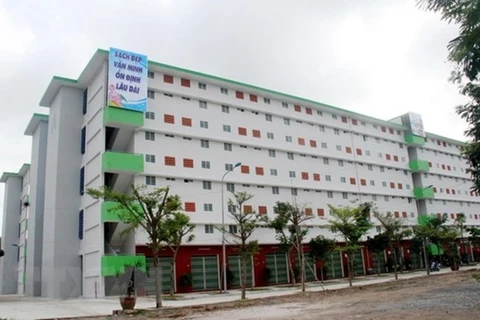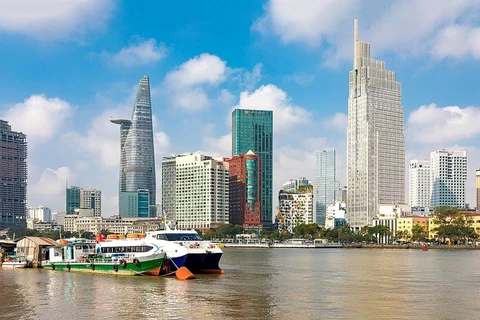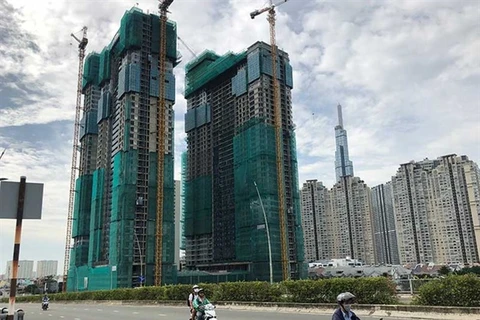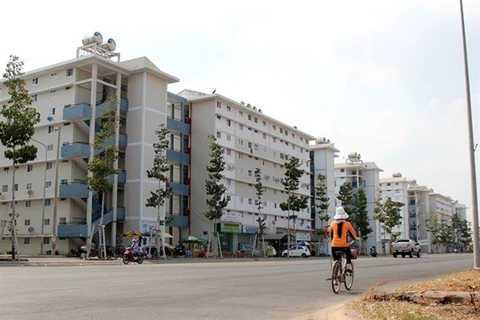Hanoi (VNS/VNA) - Demand for low-priced social houses and houses for long-term rent was high but incentive policies have not yet encouraged investors.
At present, dozens of low-priced social housing projects in Hanoi and Ho Chi Minh City had not yet been given preferential loans from the Government.
Le Huu Nghia, director of the Le Thanh Company, told Tien Phong (Vanguard) Newspaper that for years his company had invested into building more than 3,000 low-priced houses in Binh Tan district of HCM City.
The company sold the houses at prices of 12-13 million VND (500-550 USD) per sq.m, Nghia said.
In addition, the company had completed a social housing project with 930 apartments for rent with tenures of 50 years, said the director.
However, procedures for land use and soft loans had not yet been completed, so the company had to pay interest of 11 percent per year, he said.
“In fact, policies for social housing development had been slowly implemented with overlapping regulations on taxes,” Nghia said.
For example, decree 100 regulates that social houses for rent will be given 70 percent reduction of VAT and corporate income tax.
However, the tax authority had given companies 50 percent reduction in taxes as the tax authority still applied the VAT Law in 2016 and Law on Corporate Income.
The tax authority explained that the Law on Housing in 2014 stipulates the tax reductions but does not specify the rate of 70 percent. The laws on taxes is of higher legal value than decree 100.
So, the companies involved in social housing projects must pay taxes in accordance with the tax laws.
Accessing preferential loan and tax policies was difficult.
According to a representative of BIC Stock Company, investors found it hard to get soft loans.
“The businesses were given an exemption of land use fees but did not have ground clearance costs deducted, while commercial housing businesses offer the deduction,” the representative said.
“VAT was entitled to a 5 percent reduction but the input VAT was still 10 percent,” he said.
The tax incentives should be the same as land use fees, i.e., immediately converted to money for businesses by exempting input VAT, he said.
Meanwhile, a representative of the Bac 9 Company, which is undertaking the Ecohome Social House Project in Hanoi, said that procedures for tax incentives was hindering investors and businesses.
To get tax reductions and exemptions, the tax agency required lists of customers first, he said.
“It was impossible. How can businesses get the lists if they had not sold houses or apartments yet?” he said.
“The procedures to get tax reductions or exemptions were really complicated,” he added.
Complicated procedures
Nguyen Chi Dung, vice director of the Hanoi Construction Department, told the paper that the soft loans for social housing projects were taken from the budget revenues of projects under 10ha, which were more than 10 trillion VND (427 million USD), Dung said.
The city will lend through the Hanoi Development Investment Fund with preferential interest rates, he said.
“However, the lending must be based on principles of safety and efficiency of loans,” Dung said.
“Last year, the preferential loans for social housing projects were very few. Hanoi was only allocated tens of billions of dong for both investors and home buyers,” he said.
Meanwhile, Chu Nguyen Thanh, director of the Hanoi Development Investment Fund, said the fund was allowed to lend more than 200 billion VND (8.5 million USD) per project with a yearly interest rate of 6.95 percent.
The rate was lower than commercial banks and did not change during the bank loan period, Thanh said.
The fund had also opened seminars approaching investors but few of them were interested.
Maybe, investors preferred to work with commercial banks over the fund because the bank's procedures were more flexible, Thanh said.
Meanwhile, procedures to borrow money from the fund took four to eight years, she said.
“Investors needed a fast and flexible process. They could not wait,” the director said./.
At present, dozens of low-priced social housing projects in Hanoi and Ho Chi Minh City had not yet been given preferential loans from the Government.
Le Huu Nghia, director of the Le Thanh Company, told Tien Phong (Vanguard) Newspaper that for years his company had invested into building more than 3,000 low-priced houses in Binh Tan district of HCM City.
The company sold the houses at prices of 12-13 million VND (500-550 USD) per sq.m, Nghia said.
In addition, the company had completed a social housing project with 930 apartments for rent with tenures of 50 years, said the director.
However, procedures for land use and soft loans had not yet been completed, so the company had to pay interest of 11 percent per year, he said.
“In fact, policies for social housing development had been slowly implemented with overlapping regulations on taxes,” Nghia said.
For example, decree 100 regulates that social houses for rent will be given 70 percent reduction of VAT and corporate income tax.
However, the tax authority had given companies 50 percent reduction in taxes as the tax authority still applied the VAT Law in 2016 and Law on Corporate Income.
The tax authority explained that the Law on Housing in 2014 stipulates the tax reductions but does not specify the rate of 70 percent. The laws on taxes is of higher legal value than decree 100.
So, the companies involved in social housing projects must pay taxes in accordance with the tax laws.
Accessing preferential loan and tax policies was difficult.
According to a representative of BIC Stock Company, investors found it hard to get soft loans.
“The businesses were given an exemption of land use fees but did not have ground clearance costs deducted, while commercial housing businesses offer the deduction,” the representative said.
“VAT was entitled to a 5 percent reduction but the input VAT was still 10 percent,” he said.
The tax incentives should be the same as land use fees, i.e., immediately converted to money for businesses by exempting input VAT, he said.
Meanwhile, a representative of the Bac 9 Company, which is undertaking the Ecohome Social House Project in Hanoi, said that procedures for tax incentives was hindering investors and businesses.
To get tax reductions and exemptions, the tax agency required lists of customers first, he said.
“It was impossible. How can businesses get the lists if they had not sold houses or apartments yet?” he said.
“The procedures to get tax reductions or exemptions were really complicated,” he added.
Complicated procedures
Nguyen Chi Dung, vice director of the Hanoi Construction Department, told the paper that the soft loans for social housing projects were taken from the budget revenues of projects under 10ha, which were more than 10 trillion VND (427 million USD), Dung said.
The city will lend through the Hanoi Development Investment Fund with preferential interest rates, he said.
“However, the lending must be based on principles of safety and efficiency of loans,” Dung said.
“Last year, the preferential loans for social housing projects were very few. Hanoi was only allocated tens of billions of dong for both investors and home buyers,” he said.
Meanwhile, Chu Nguyen Thanh, director of the Hanoi Development Investment Fund, said the fund was allowed to lend more than 200 billion VND (8.5 million USD) per project with a yearly interest rate of 6.95 percent.
The rate was lower than commercial banks and did not change during the bank loan period, Thanh said.
The fund had also opened seminars approaching investors but few of them were interested.
Maybe, investors preferred to work with commercial banks over the fund because the bank's procedures were more flexible, Thanh said.
Meanwhile, procedures to borrow money from the fund took four to eight years, she said.
“Investors needed a fast and flexible process. They could not wait,” the director said./.
VNA
























